Building Resilience: Promoting Mental Well-being for Care Nurses
VerifiedAdded on 2023/06/10
|9
|2268
|162
Report
AI Summary
This report explores the impact of stress and pressure on the mental well-being of care nurses and the importance of resilience in managing these challenges. It discusses the physical and psychological effects of stress, highlighting factors that contribute to decreased job satisfaction and patient care quality. The report emphasizes the connection between resilience and mental well-being, noting that resilience helps nurses overcome stress and adapt to new situations. It identifies factors that improve well-being, such as effective communication and resilience training, and factors that negatively affect it, such as job stress and low organizational support. Furthermore, the report outlines behaviors linked to resilience, ways to build resilience, and methods for managing and maintaining mental well-being, including personal practices and organizational support strategies. The study concludes that addressing distress and pressure among care nurses is essential for delivering quality patient care.
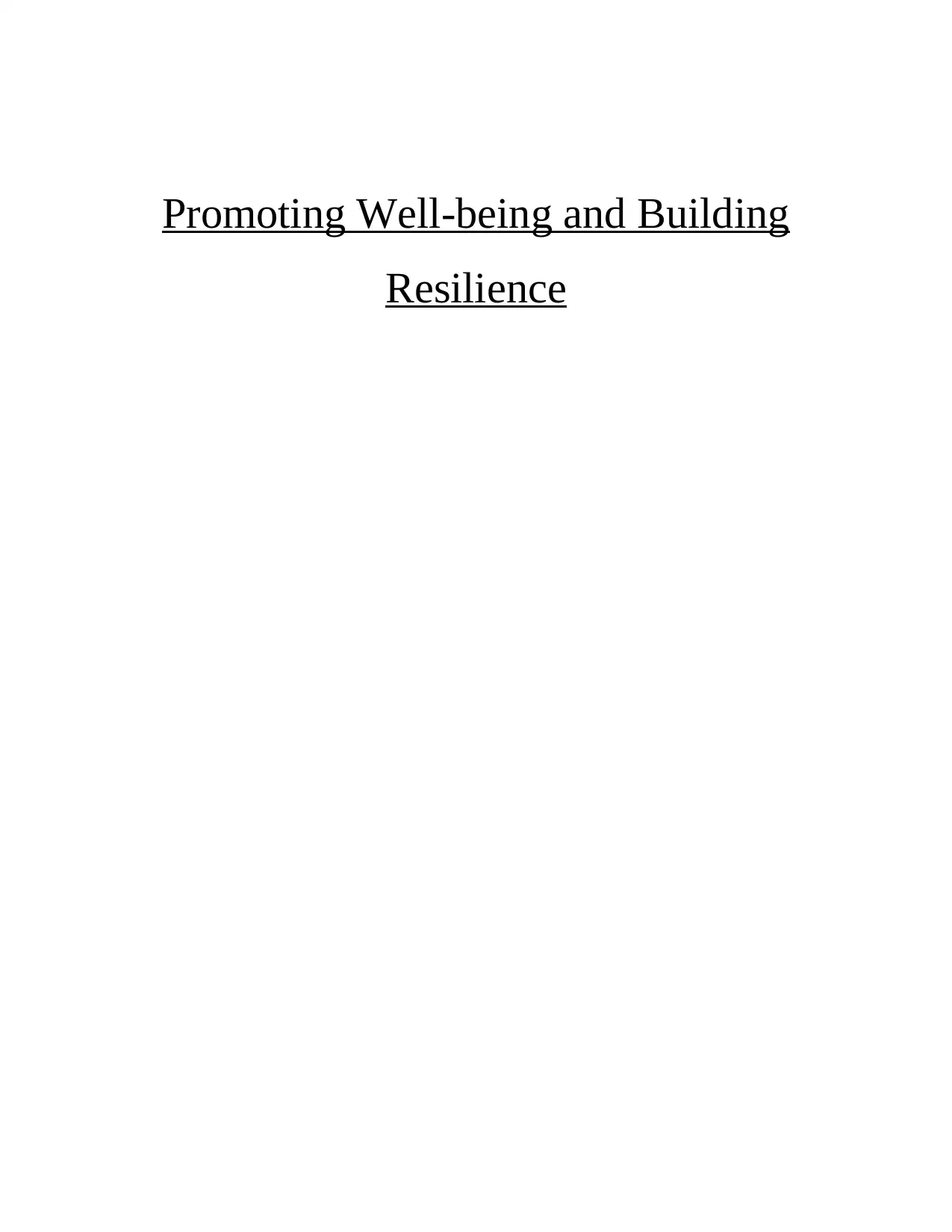
Promoting Well-being and Building
Resilience
Resilience
Paraphrase This Document
Need a fresh take? Get an instant paraphrase of this document with our AI Paraphraser
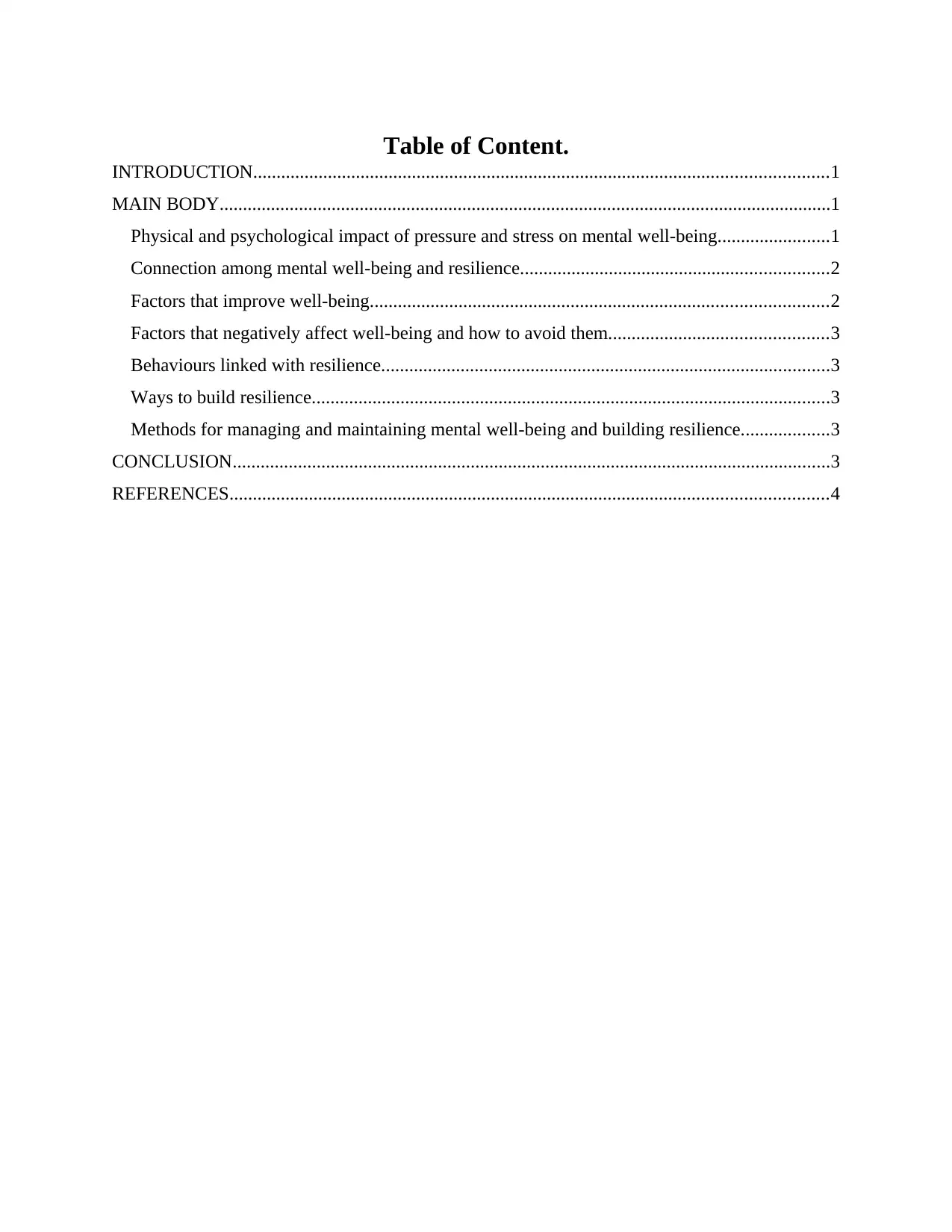
Table of Content.
INTRODUCTION...........................................................................................................................1
MAIN BODY...................................................................................................................................1
Physical and psychological impact of pressure and stress on mental well-being........................1
Connection among mental well-being and resilience..................................................................2
Factors that improve well-being..................................................................................................2
Factors that negatively affect well-being and how to avoid them...............................................3
Behaviours linked with resilience................................................................................................3
Ways to build resilience...............................................................................................................3
Methods for managing and maintaining mental well-being and building resilience...................3
CONCLUSION................................................................................................................................3
REFERENCES................................................................................................................................4
INTRODUCTION...........................................................................................................................1
MAIN BODY...................................................................................................................................1
Physical and psychological impact of pressure and stress on mental well-being........................1
Connection among mental well-being and resilience..................................................................2
Factors that improve well-being..................................................................................................2
Factors that negatively affect well-being and how to avoid them...............................................3
Behaviours linked with resilience................................................................................................3
Ways to build resilience...............................................................................................................3
Methods for managing and maintaining mental well-being and building resilience...................3
CONCLUSION................................................................................................................................3
REFERENCES................................................................................................................................4
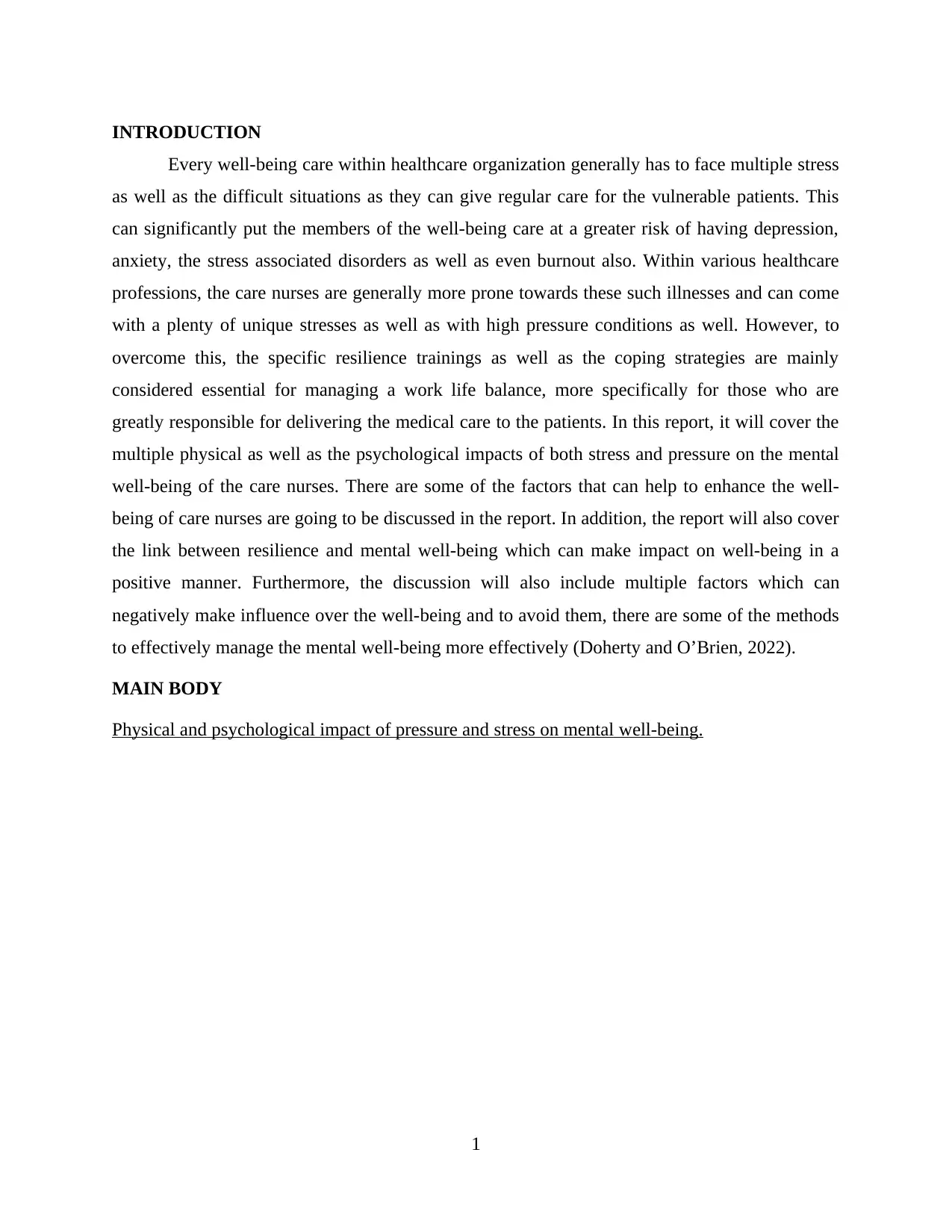
INTRODUCTION
Every well-being care within healthcare organization generally has to face multiple stress
as well as the difficult situations as they can give regular care for the vulnerable patients. This
can significantly put the members of the well-being care at a greater risk of having depression,
anxiety, the stress associated disorders as well as even burnout also. Within various healthcare
professions, the care nurses are generally more prone towards these such illnesses and can come
with a plenty of unique stresses as well as with high pressure conditions as well. However, to
overcome this, the specific resilience trainings as well as the coping strategies are mainly
considered essential for managing a work life balance, more specifically for those who are
greatly responsible for delivering the medical care to the patients. In this report, it will cover the
multiple physical as well as the psychological impacts of both stress and pressure on the mental
well-being of the care nurses. There are some of the factors that can help to enhance the well-
being of care nurses are going to be discussed in the report. In addition, the report will also cover
the link between resilience and mental well-being which can make impact on well-being in a
positive manner. Furthermore, the discussion will also include multiple factors which can
negatively make influence over the well-being and to avoid them, there are some of the methods
to effectively manage the mental well-being more effectively (Doherty and O’Brien, 2022).
MAIN BODY
Physical and psychological impact of pressure and stress on mental well-being.
1
Every well-being care within healthcare organization generally has to face multiple stress
as well as the difficult situations as they can give regular care for the vulnerable patients. This
can significantly put the members of the well-being care at a greater risk of having depression,
anxiety, the stress associated disorders as well as even burnout also. Within various healthcare
professions, the care nurses are generally more prone towards these such illnesses and can come
with a plenty of unique stresses as well as with high pressure conditions as well. However, to
overcome this, the specific resilience trainings as well as the coping strategies are mainly
considered essential for managing a work life balance, more specifically for those who are
greatly responsible for delivering the medical care to the patients. In this report, it will cover the
multiple physical as well as the psychological impacts of both stress and pressure on the mental
well-being of the care nurses. There are some of the factors that can help to enhance the well-
being of care nurses are going to be discussed in the report. In addition, the report will also cover
the link between resilience and mental well-being which can make impact on well-being in a
positive manner. Furthermore, the discussion will also include multiple factors which can
negatively make influence over the well-being and to avoid them, there are some of the methods
to effectively manage the mental well-being more effectively (Doherty and O’Brien, 2022).
MAIN BODY
Physical and psychological impact of pressure and stress on mental well-being.
1
⊘ This is a preview!⊘
Do you want full access?
Subscribe today to unlock all pages.

Trusted by 1+ million students worldwide
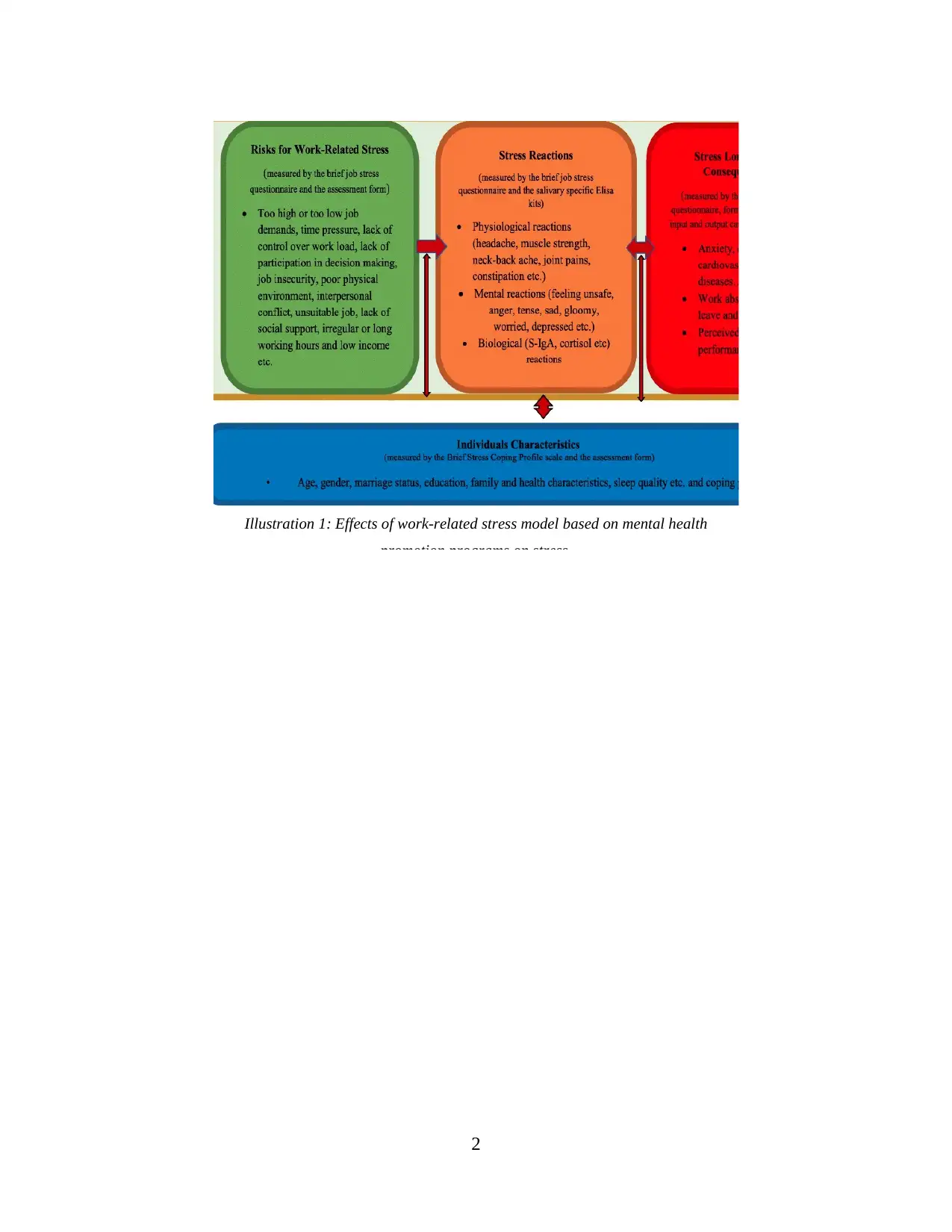
2
Illustration 1: Effects of work-related stress model based on mental health
promotion programs on stress.
Illustration 1: Effects of work-related stress model based on mental health
promotion programs on stress.
Paraphrase This Document
Need a fresh take? Get an instant paraphrase of this document with our AI Paraphraser
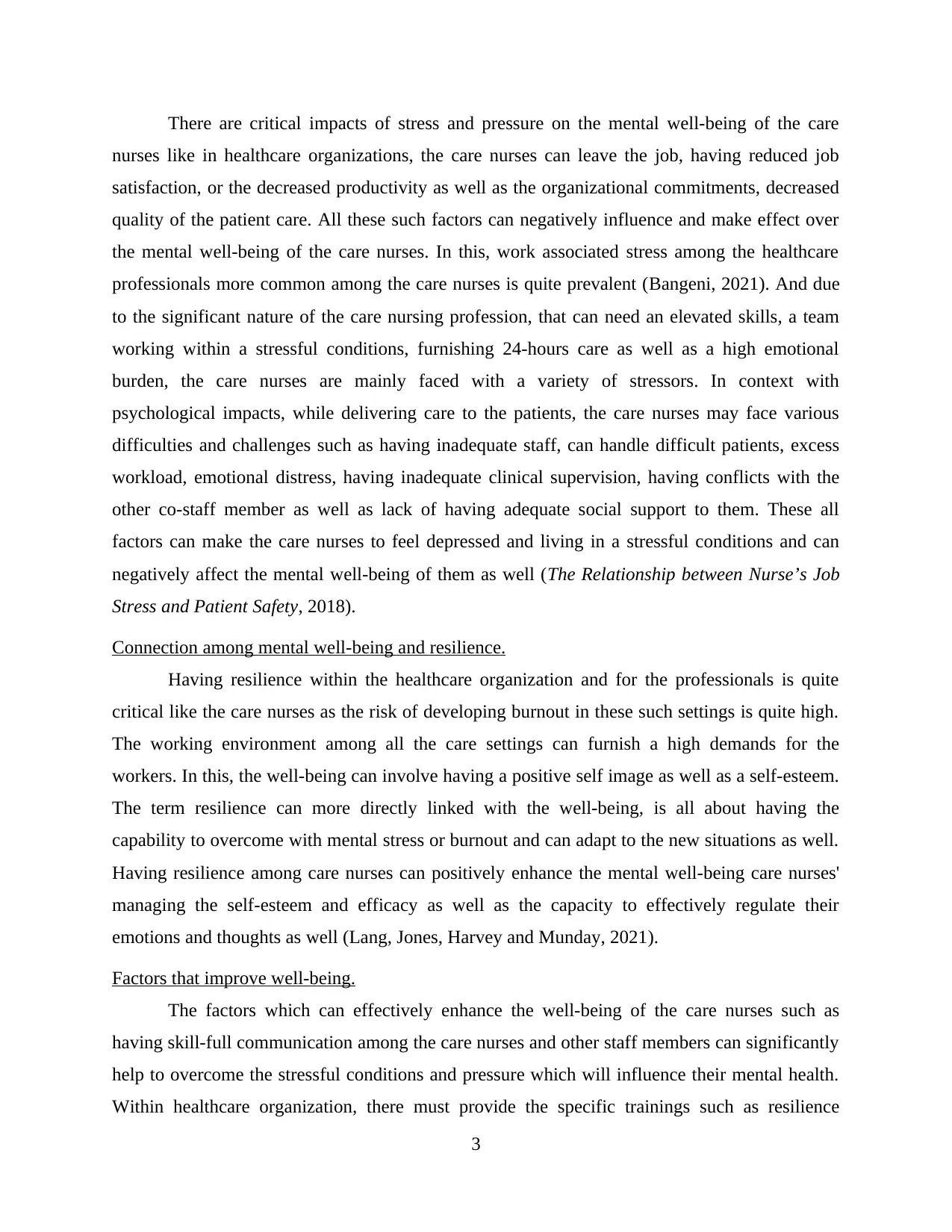
There are critical impacts of stress and pressure on the mental well-being of the care
nurses like in healthcare organizations, the care nurses can leave the job, having reduced job
satisfaction, or the decreased productivity as well as the organizational commitments, decreased
quality of the patient care. All these such factors can negatively influence and make effect over
the mental well-being of the care nurses. In this, work associated stress among the healthcare
professionals more common among the care nurses is quite prevalent (Bangeni, 2021). And due
to the significant nature of the care nursing profession, that can need an elevated skills, a team
working within a stressful conditions, furnishing 24-hours care as well as a high emotional
burden, the care nurses are mainly faced with a variety of stressors. In context with
psychological impacts, while delivering care to the patients, the care nurses may face various
difficulties and challenges such as having inadequate staff, can handle difficult patients, excess
workload, emotional distress, having inadequate clinical supervision, having conflicts with the
other co-staff member as well as lack of having adequate social support to them. These all
factors can make the care nurses to feel depressed and living in a stressful conditions and can
negatively affect the mental well-being of them as well (The Relationship between Nurse’s Job
Stress and Patient Safety, 2018).
Connection among mental well-being and resilience.
Having resilience within the healthcare organization and for the professionals is quite
critical like the care nurses as the risk of developing burnout in these such settings is quite high.
The working environment among all the care settings can furnish a high demands for the
workers. In this, the well-being can involve having a positive self image as well as a self-esteem.
The term resilience can more directly linked with the well-being, is all about having the
capability to overcome with mental stress or burnout and can adapt to the new situations as well.
Having resilience among care nurses can positively enhance the mental well-being care nurses'
managing the self-esteem and efficacy as well as the capacity to effectively regulate their
emotions and thoughts as well (Lang, Jones, Harvey and Munday, 2021).
Factors that improve well-being.
The factors which can effectively enhance the well-being of the care nurses such as
having skill-full communication among the care nurses and other staff members can significantly
help to overcome the stressful conditions and pressure which will influence their mental health.
Within healthcare organization, there must provide the specific trainings such as resilience
3
nurses like in healthcare organizations, the care nurses can leave the job, having reduced job
satisfaction, or the decreased productivity as well as the organizational commitments, decreased
quality of the patient care. All these such factors can negatively influence and make effect over
the mental well-being of the care nurses. In this, work associated stress among the healthcare
professionals more common among the care nurses is quite prevalent (Bangeni, 2021). And due
to the significant nature of the care nursing profession, that can need an elevated skills, a team
working within a stressful conditions, furnishing 24-hours care as well as a high emotional
burden, the care nurses are mainly faced with a variety of stressors. In context with
psychological impacts, while delivering care to the patients, the care nurses may face various
difficulties and challenges such as having inadequate staff, can handle difficult patients, excess
workload, emotional distress, having inadequate clinical supervision, having conflicts with the
other co-staff member as well as lack of having adequate social support to them. These all
factors can make the care nurses to feel depressed and living in a stressful conditions and can
negatively affect the mental well-being of them as well (The Relationship between Nurse’s Job
Stress and Patient Safety, 2018).
Connection among mental well-being and resilience.
Having resilience within the healthcare organization and for the professionals is quite
critical like the care nurses as the risk of developing burnout in these such settings is quite high.
The working environment among all the care settings can furnish a high demands for the
workers. In this, the well-being can involve having a positive self image as well as a self-esteem.
The term resilience can more directly linked with the well-being, is all about having the
capability to overcome with mental stress or burnout and can adapt to the new situations as well.
Having resilience among care nurses can positively enhance the mental well-being care nurses'
managing the self-esteem and efficacy as well as the capacity to effectively regulate their
emotions and thoughts as well (Lang, Jones, Harvey and Munday, 2021).
Factors that improve well-being.
The factors which can effectively enhance the well-being of the care nurses such as
having skill-full communication among the care nurses and other staff members can significantly
help to overcome the stressful conditions and pressure which will influence their mental health.
Within healthcare organization, there must provide the specific trainings such as resilience
3
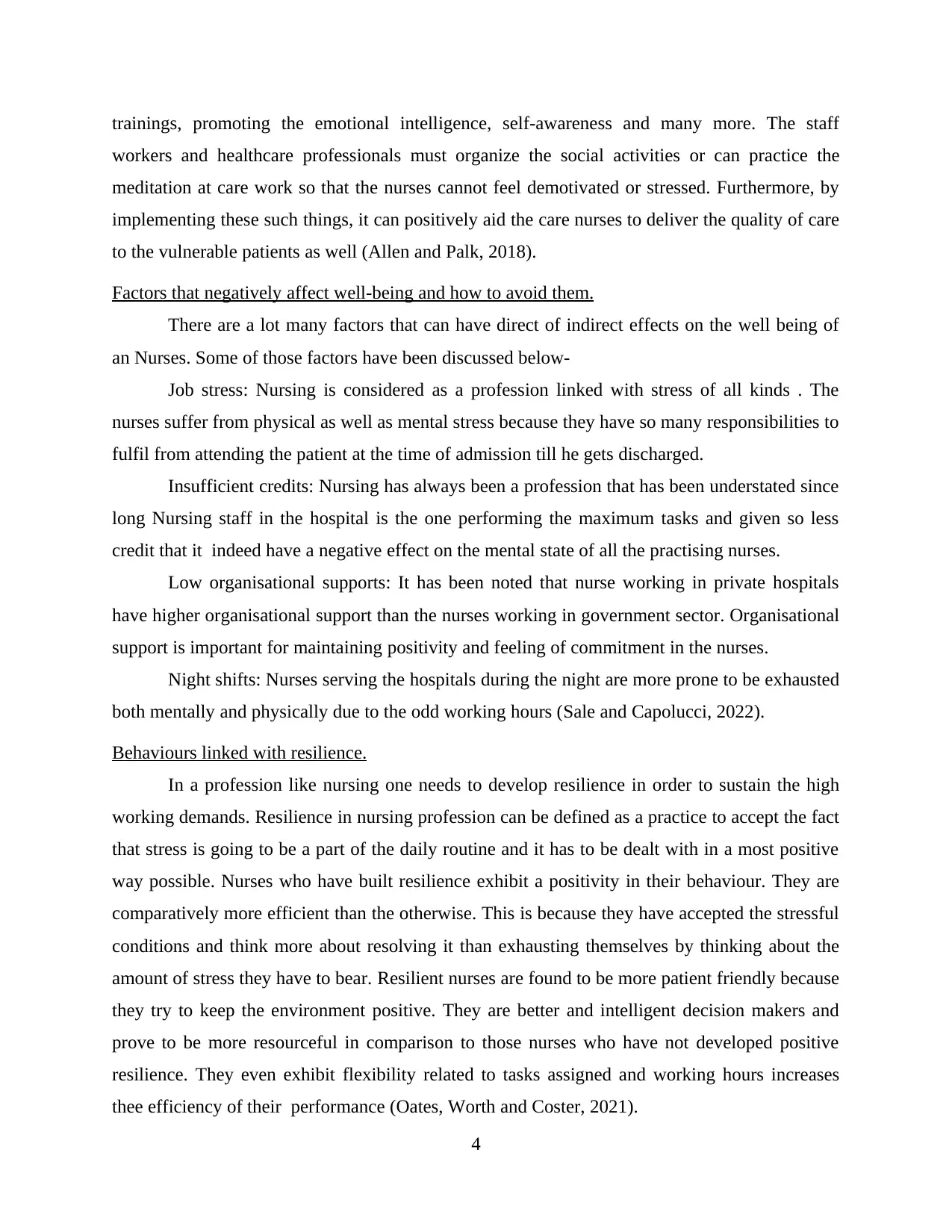
trainings, promoting the emotional intelligence, self-awareness and many more. The staff
workers and healthcare professionals must organize the social activities or can practice the
meditation at care work so that the nurses cannot feel demotivated or stressed. Furthermore, by
implementing these such things, it can positively aid the care nurses to deliver the quality of care
to the vulnerable patients as well (Allen and Palk, 2018).
Factors that negatively affect well-being and how to avoid them.
There are a lot many factors that can have direct of indirect effects on the well being of
an Nurses. Some of those factors have been discussed below-
Job stress: Nursing is considered as a profession linked with stress of all kinds . The
nurses suffer from physical as well as mental stress because they have so many responsibilities to
fulfil from attending the patient at the time of admission till he gets discharged.
Insufficient credits: Nursing has always been a profession that has been understated since
long Nursing staff in the hospital is the one performing the maximum tasks and given so less
credit that it indeed have a negative effect on the mental state of all the practising nurses.
Low organisational supports: It has been noted that nurse working in private hospitals
have higher organisational support than the nurses working in government sector. Organisational
support is important for maintaining positivity and feeling of commitment in the nurses.
Night shifts: Nurses serving the hospitals during the night are more prone to be exhausted
both mentally and physically due to the odd working hours (Sale and Capolucci, 2022).
Behaviours linked with resilience.
In a profession like nursing one needs to develop resilience in order to sustain the high
working demands. Resilience in nursing profession can be defined as a practice to accept the fact
that stress is going to be a part of the daily routine and it has to be dealt with in a most positive
way possible. Nurses who have built resilience exhibit a positivity in their behaviour. They are
comparatively more efficient than the otherwise. This is because they have accepted the stressful
conditions and think more about resolving it than exhausting themselves by thinking about the
amount of stress they have to bear. Resilient nurses are found to be more patient friendly because
they try to keep the environment positive. They are better and intelligent decision makers and
prove to be more resourceful in comparison to those nurses who have not developed positive
resilience. They even exhibit flexibility related to tasks assigned and working hours increases
thee efficiency of their performance (Oates, Worth and Coster, 2021).
4
workers and healthcare professionals must organize the social activities or can practice the
meditation at care work so that the nurses cannot feel demotivated or stressed. Furthermore, by
implementing these such things, it can positively aid the care nurses to deliver the quality of care
to the vulnerable patients as well (Allen and Palk, 2018).
Factors that negatively affect well-being and how to avoid them.
There are a lot many factors that can have direct of indirect effects on the well being of
an Nurses. Some of those factors have been discussed below-
Job stress: Nursing is considered as a profession linked with stress of all kinds . The
nurses suffer from physical as well as mental stress because they have so many responsibilities to
fulfil from attending the patient at the time of admission till he gets discharged.
Insufficient credits: Nursing has always been a profession that has been understated since
long Nursing staff in the hospital is the one performing the maximum tasks and given so less
credit that it indeed have a negative effect on the mental state of all the practising nurses.
Low organisational supports: It has been noted that nurse working in private hospitals
have higher organisational support than the nurses working in government sector. Organisational
support is important for maintaining positivity and feeling of commitment in the nurses.
Night shifts: Nurses serving the hospitals during the night are more prone to be exhausted
both mentally and physically due to the odd working hours (Sale and Capolucci, 2022).
Behaviours linked with resilience.
In a profession like nursing one needs to develop resilience in order to sustain the high
working demands. Resilience in nursing profession can be defined as a practice to accept the fact
that stress is going to be a part of the daily routine and it has to be dealt with in a most positive
way possible. Nurses who have built resilience exhibit a positivity in their behaviour. They are
comparatively more efficient than the otherwise. This is because they have accepted the stressful
conditions and think more about resolving it than exhausting themselves by thinking about the
amount of stress they have to bear. Resilient nurses are found to be more patient friendly because
they try to keep the environment positive. They are better and intelligent decision makers and
prove to be more resourceful in comparison to those nurses who have not developed positive
resilience. They even exhibit flexibility related to tasks assigned and working hours increases
thee efficiency of their performance (Oates, Worth and Coster, 2021).
4
⊘ This is a preview!⊘
Do you want full access?
Subscribe today to unlock all pages.

Trusted by 1+ million students worldwide
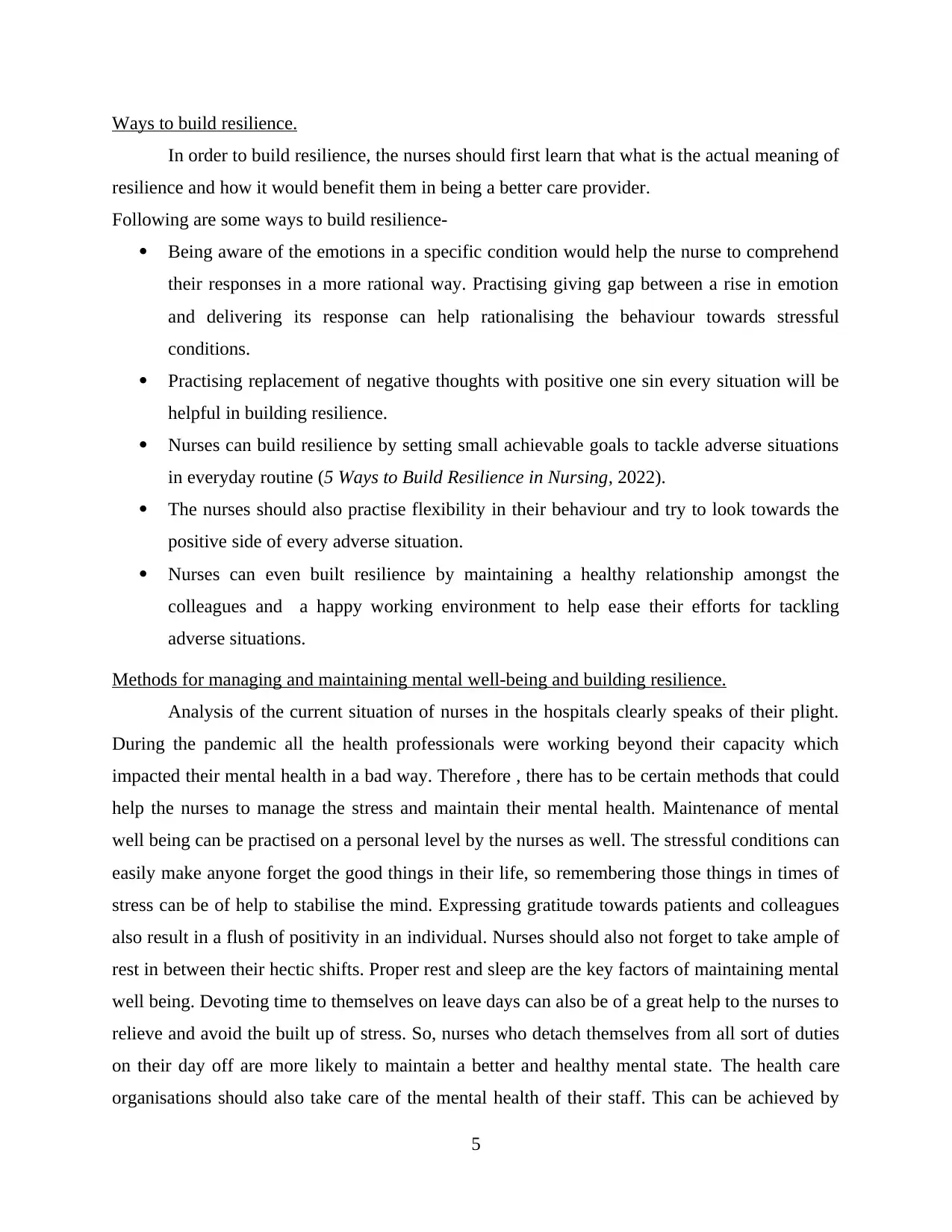
Ways to build resilience.
In order to build resilience, the nurses should first learn that what is the actual meaning of
resilience and how it would benefit them in being a better care provider.
Following are some ways to build resilience-
Being aware of the emotions in a specific condition would help the nurse to comprehend
their responses in a more rational way. Practising giving gap between a rise in emotion
and delivering its response can help rationalising the behaviour towards stressful
conditions.
Practising replacement of negative thoughts with positive one sin every situation will be
helpful in building resilience.
Nurses can build resilience by setting small achievable goals to tackle adverse situations
in everyday routine (5 Ways to Build Resilience in Nursing, 2022).
The nurses should also practise flexibility in their behaviour and try to look towards the
positive side of every adverse situation.
Nurses can even built resilience by maintaining a healthy relationship amongst the
colleagues and a happy working environment to help ease their efforts for tackling
adverse situations.
Methods for managing and maintaining mental well-being and building resilience.
Analysis of the current situation of nurses in the hospitals clearly speaks of their plight.
During the pandemic all the health professionals were working beyond their capacity which
impacted their mental health in a bad way. Therefore , there has to be certain methods that could
help the nurses to manage the stress and maintain their mental health. Maintenance of mental
well being can be practised on a personal level by the nurses as well. The stressful conditions can
easily make anyone forget the good things in their life, so remembering those things in times of
stress can be of help to stabilise the mind. Expressing gratitude towards patients and colleagues
also result in a flush of positivity in an individual. Nurses should also not forget to take ample of
rest in between their hectic shifts. Proper rest and sleep are the key factors of maintaining mental
well being. Devoting time to themselves on leave days can also be of a great help to the nurses to
relieve and avoid the built up of stress. So, nurses who detach themselves from all sort of duties
on their day off are more likely to maintain a better and healthy mental state. The health care
organisations should also take care of the mental health of their staff. This can be achieved by
5
In order to build resilience, the nurses should first learn that what is the actual meaning of
resilience and how it would benefit them in being a better care provider.
Following are some ways to build resilience-
Being aware of the emotions in a specific condition would help the nurse to comprehend
their responses in a more rational way. Practising giving gap between a rise in emotion
and delivering its response can help rationalising the behaviour towards stressful
conditions.
Practising replacement of negative thoughts with positive one sin every situation will be
helpful in building resilience.
Nurses can build resilience by setting small achievable goals to tackle adverse situations
in everyday routine (5 Ways to Build Resilience in Nursing, 2022).
The nurses should also practise flexibility in their behaviour and try to look towards the
positive side of every adverse situation.
Nurses can even built resilience by maintaining a healthy relationship amongst the
colleagues and a happy working environment to help ease their efforts for tackling
adverse situations.
Methods for managing and maintaining mental well-being and building resilience.
Analysis of the current situation of nurses in the hospitals clearly speaks of their plight.
During the pandemic all the health professionals were working beyond their capacity which
impacted their mental health in a bad way. Therefore , there has to be certain methods that could
help the nurses to manage the stress and maintain their mental health. Maintenance of mental
well being can be practised on a personal level by the nurses as well. The stressful conditions can
easily make anyone forget the good things in their life, so remembering those things in times of
stress can be of help to stabilise the mind. Expressing gratitude towards patients and colleagues
also result in a flush of positivity in an individual. Nurses should also not forget to take ample of
rest in between their hectic shifts. Proper rest and sleep are the key factors of maintaining mental
well being. Devoting time to themselves on leave days can also be of a great help to the nurses to
relieve and avoid the built up of stress. So, nurses who detach themselves from all sort of duties
on their day off are more likely to maintain a better and healthy mental state. The health care
organisations should also take care of the mental health of their staff. This can be achieved by
5
Paraphrase This Document
Need a fresh take? Get an instant paraphrase of this document with our AI Paraphraser
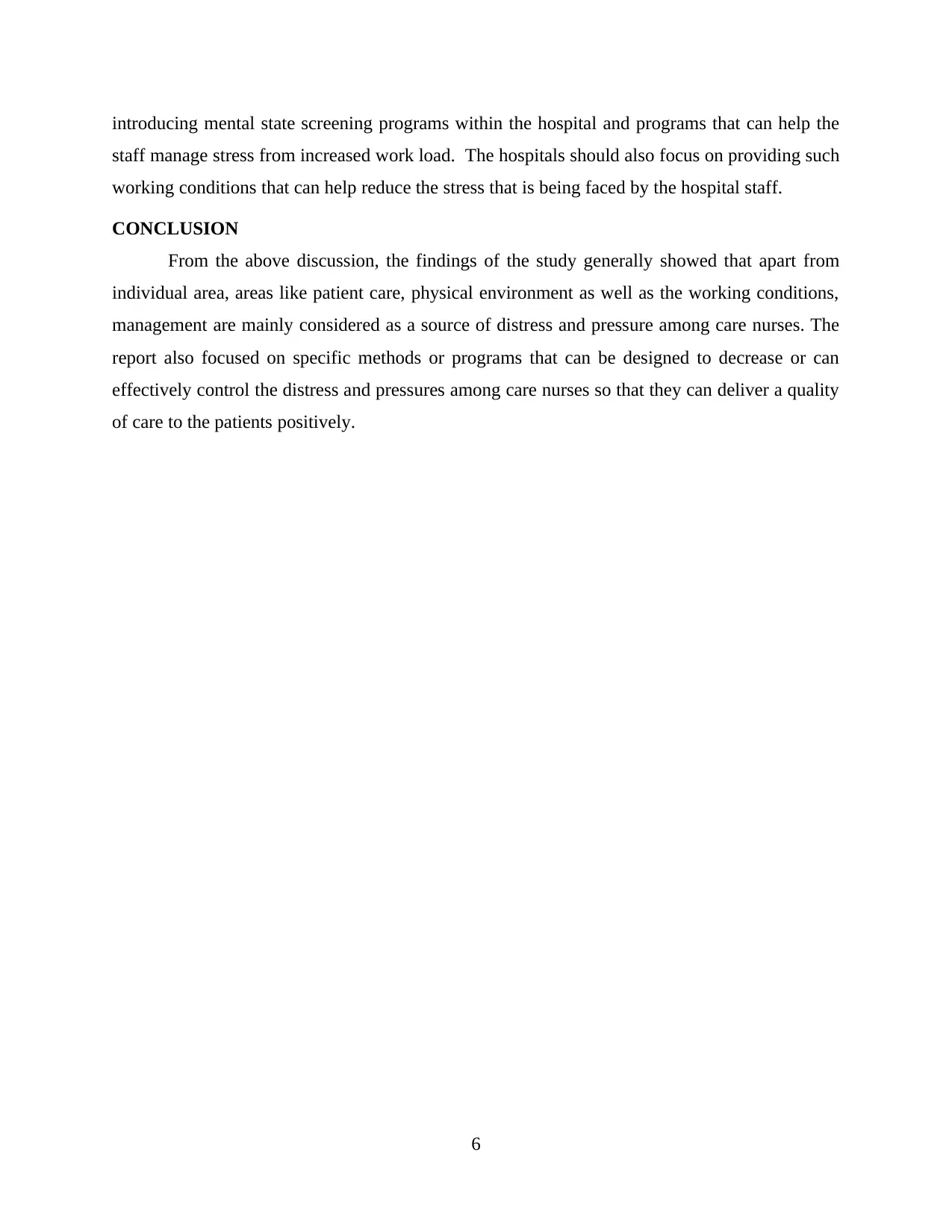
introducing mental state screening programs within the hospital and programs that can help the
staff manage stress from increased work load. The hospitals should also focus on providing such
working conditions that can help reduce the stress that is being faced by the hospital staff.
CONCLUSION
From the above discussion, the findings of the study generally showed that apart from
individual area, areas like patient care, physical environment as well as the working conditions,
management are mainly considered as a source of distress and pressure among care nurses. The
report also focused on specific methods or programs that can be designed to decrease or can
effectively control the distress and pressures among care nurses so that they can deliver a quality
of care to the patients positively.
6
staff manage stress from increased work load. The hospitals should also focus on providing such
working conditions that can help reduce the stress that is being faced by the hospital staff.
CONCLUSION
From the above discussion, the findings of the study generally showed that apart from
individual area, areas like patient care, physical environment as well as the working conditions,
management are mainly considered as a source of distress and pressure among care nurses. The
report also focused on specific methods or programs that can be designed to decrease or can
effectively control the distress and pressures among care nurses so that they can deliver a quality
of care to the patients positively.
6
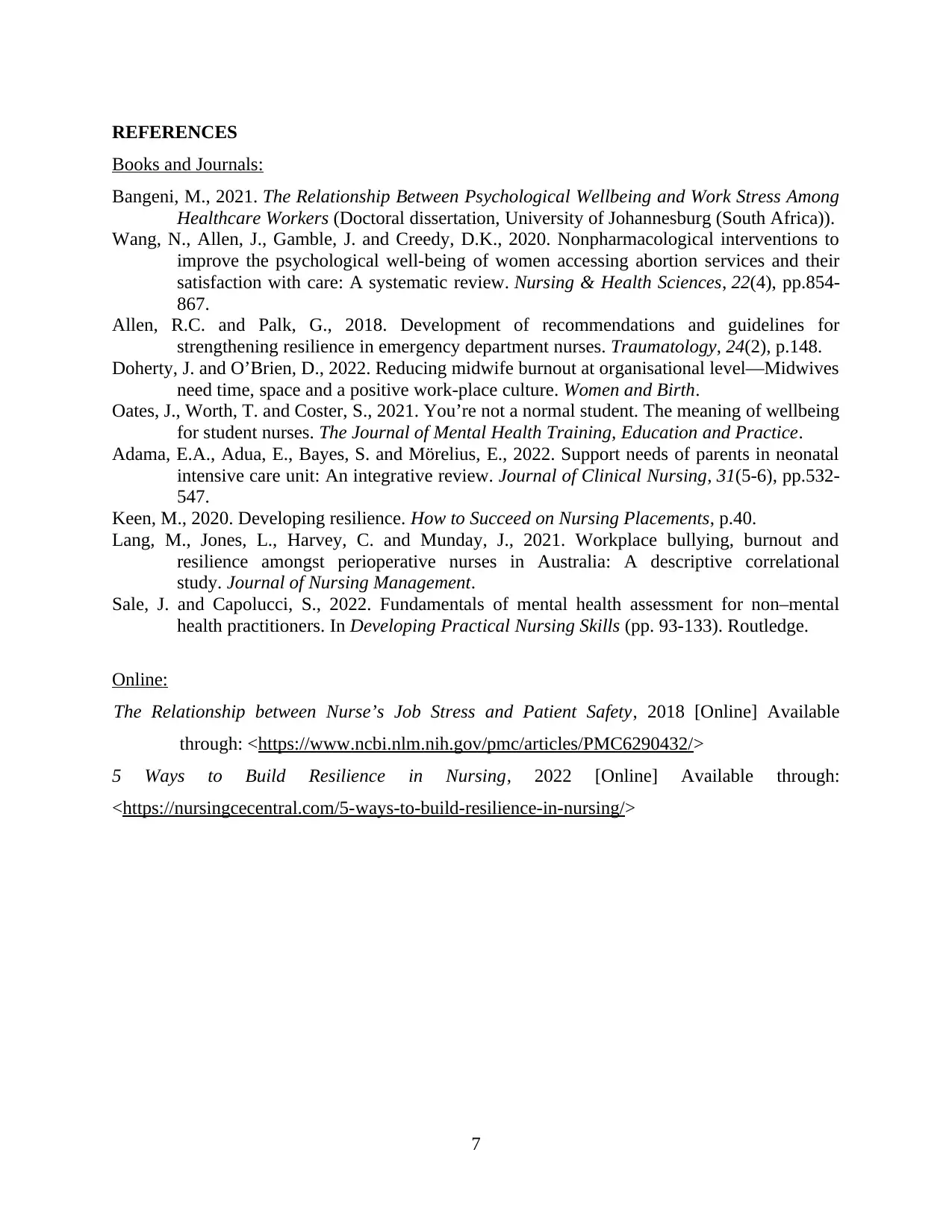
REFERENCES
Books and Journals:
Bangeni, M., 2021. The Relationship Between Psychological Wellbeing and Work Stress Among
Healthcare Workers (Doctoral dissertation, University of Johannesburg (South Africa)).
Wang, N., Allen, J., Gamble, J. and Creedy, D.K., 2020. Nonpharmacological interventions to
improve the psychological well‐being of women accessing abortion services and their
satisfaction with care: A systematic review. Nursing & Health Sciences, 22(4), pp.854-
867.
Allen, R.C. and Palk, G., 2018. Development of recommendations and guidelines for
strengthening resilience in emergency department nurses. Traumatology, 24(2), p.148.
Doherty, J. and O’Brien, D., 2022. Reducing midwife burnout at organisational level—Midwives
need time, space and a positive work-place culture. Women and Birth.
Oates, J., Worth, T. and Coster, S., 2021. You’re not a normal student. The meaning of wellbeing
for student nurses. The Journal of Mental Health Training, Education and Practice.
Adama, E.A., Adua, E., Bayes, S. and Mörelius, E., 2022. Support needs of parents in neonatal
intensive care unit: An integrative review. Journal of Clinical Nursing, 31(5-6), pp.532-
547.
Keen, M., 2020. Developing resilience. How to Succeed on Nursing Placements, p.40.
Lang, M., Jones, L., Harvey, C. and Munday, J., 2021. Workplace bullying, burnout and
resilience amongst perioperative nurses in Australia: A descriptive correlational
study. Journal of Nursing Management.
Sale, J. and Capolucci, S., 2022. Fundamentals of mental health assessment for non–mental
health practitioners. In Developing Practical Nursing Skills (pp. 93-133). Routledge.
Online:
The Relationship between Nurse’s Job Stress and Patient Safety, 2018 [Online] Available
through: <https://www.ncbi.nlm.nih.gov/pmc/articles/PMC6290432/>
5 Ways to Build Resilience in Nursing, 2022 [Online] Available through:
<https://nursingcecentral.com/5-ways-to-build-resilience-in-nursing/>
7
Books and Journals:
Bangeni, M., 2021. The Relationship Between Psychological Wellbeing and Work Stress Among
Healthcare Workers (Doctoral dissertation, University of Johannesburg (South Africa)).
Wang, N., Allen, J., Gamble, J. and Creedy, D.K., 2020. Nonpharmacological interventions to
improve the psychological well‐being of women accessing abortion services and their
satisfaction with care: A systematic review. Nursing & Health Sciences, 22(4), pp.854-
867.
Allen, R.C. and Palk, G., 2018. Development of recommendations and guidelines for
strengthening resilience in emergency department nurses. Traumatology, 24(2), p.148.
Doherty, J. and O’Brien, D., 2022. Reducing midwife burnout at organisational level—Midwives
need time, space and a positive work-place culture. Women and Birth.
Oates, J., Worth, T. and Coster, S., 2021. You’re not a normal student. The meaning of wellbeing
for student nurses. The Journal of Mental Health Training, Education and Practice.
Adama, E.A., Adua, E., Bayes, S. and Mörelius, E., 2022. Support needs of parents in neonatal
intensive care unit: An integrative review. Journal of Clinical Nursing, 31(5-6), pp.532-
547.
Keen, M., 2020. Developing resilience. How to Succeed on Nursing Placements, p.40.
Lang, M., Jones, L., Harvey, C. and Munday, J., 2021. Workplace bullying, burnout and
resilience amongst perioperative nurses in Australia: A descriptive correlational
study. Journal of Nursing Management.
Sale, J. and Capolucci, S., 2022. Fundamentals of mental health assessment for non–mental
health practitioners. In Developing Practical Nursing Skills (pp. 93-133). Routledge.
Online:
The Relationship between Nurse’s Job Stress and Patient Safety, 2018 [Online] Available
through: <https://www.ncbi.nlm.nih.gov/pmc/articles/PMC6290432/>
5 Ways to Build Resilience in Nursing, 2022 [Online] Available through:
<https://nursingcecentral.com/5-ways-to-build-resilience-in-nursing/>
7
⊘ This is a preview!⊘
Do you want full access?
Subscribe today to unlock all pages.

Trusted by 1+ million students worldwide
1 out of 9
Related Documents
Your All-in-One AI-Powered Toolkit for Academic Success.
+13062052269
info@desklib.com
Available 24*7 on WhatsApp / Email
![[object Object]](/_next/static/media/star-bottom.7253800d.svg)
Unlock your academic potential
Copyright © 2020–2026 A2Z Services. All Rights Reserved. Developed and managed by ZUCOL.




